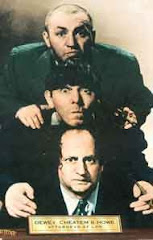Here is a quick recap of yesterday...
The belief held by many that health care is a right is plagued by some inherent difficulties. Among these are the following:
(1) Health care is difficult to adequately define and as such is difficult to promise to anyone.
(2) Freedom from illness has not traditionally been considered a "right", as health is impossible to guarantee, even under ideal circumstances.
(4) Universal health care, like the partially-socialized plan of today, would suffer from serious inequities in the real world, with a small group paying most of the bill and a different minority reaping most of the benefit.
(5) In order to guarantee this benefit, the government would have to crush the objections of the practitioners - through force if necessary.
It is primarily for these reasons that I do not believe health care is a basic human right. Instead, I believe that it is up to each of us individually. Admittedly, my way is not perfect, and I will discuss these weaknesses of my position today.
If health care is not guaranteed, then what are we to do with the uninsured?
I admit that there is no perfect answer to this question. Almost immediately, though, I am reminded that ours is not a perfect world. Historically, though, these less fortunate citizens were cared for by private citizens and their organizations. I believe strongly that they do a better job of dealing with specific issues than the government does. The government requires, by its nature, a large beauracracy for even the smallest task. This causes the work of the government to be particularly wasteful. A church or civic organization, on the other hand, requires almost no additional manpower, is quick to act, and by acting, strengthens its community in ways the government can not hope to.
What about the children?
Children, due to their vulnerability and their inability to completely care for themselves, must be cared for by others when things go wrong. Continuing to care for all children without other resources under the age of 18, even expanding coverage for them, seems to be the right thing to do. I am a capitalist, but I am not heartless.
By requiring all able-bodied adults to care for themselves, it allows them the opportunity to make conscious decisions about their health, not just their health care. Worrying about one's health and taking proper steps to ensure it should never be the responsibility of some third party. Why would it be? This mindset betrays the worst sort of authoritarian parentalism in our government. If I were a cynic, I might think that the people who want to create this sort of dependency for even the most personal of matters are only trying to create a large segment of the population who will continue to vote for the person or the party who will continue that life-support. If I were a cynic.
The notion that the medically indigent are somehow unwitting victims of circumstance is held only by some of those who have never actually worked with this population. The generations of dependency have caused them to be completely irresponsible, in many cases, making poor lifestyle choices and further increasing their need for health care. It is a vicious cycle. They choose cigarrettes instead of medicine, then complain about the limits on the numbers of medicines they are allowed under the Program. This is ridiculous. I am exhausted, both as a hard-working taxpayer and as a physician. It is high time for us to begin the process of withdrawing benefits - not just for financial reasons, but because it is cruel to continue to convince people that the government can do a better job taking care of them than they themselves can.
Subscribe to:
Post Comments (Atom)











No comments:
Post a Comment